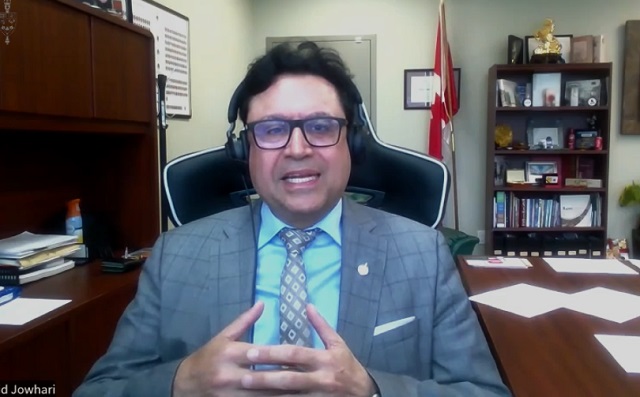National
Canada’s Governor General slammed for hosting partisan event promoting Trudeau’s ‘hate speech’ bill

From LifeSiteNews
Mary Simon, Canada’s supposed non-partisan head of state, appeared to be supporting a Liberal government bill that will further regulate the internet.
Governor General Mary Simon, who serves as Canada’s official non-partisan head of state and representative of King Charles III, has taken heat for hosting a conference supporting a new federal government bill that could lead to large fines or jail time for vaguely defined online “hate speech” infractions.
On April 11, Simon hosted an event titled “The Governor General’s Symposium: Building a Safe and Respectful Digital World” at her Rideau Hall residence, with the goal to “bring together individuals who experience online violence and experts from across the country to share their experiences, explore solutions, and create allyship and networks of resilience.”
The guest list for those invited included those supportive of Liberal Minster Attorney General Arif Virani’s Bill C-63, or Online Harms Act. Some of the invited guests included former Global News reporter Rachel Gilmore, LGBTQ activist Fae Johnstone, Chief Public Health Officer Dr. Theresa Tam, and Ottawa school trustee Nili Kaplan-Myrth. No members of the Conservative Party or independent journalists were invited.
After news spread of the event, which Simon herself posted about on X, many took to social media to voice concerns over Simon hosting the event.
“Can you imagine the Queen having a seminar at Buckingham Palace to talk about a bill before the House of Commons in England? That would be outrageous. That’s what @GGCanada Mary Simon just did,” said political commentator Tom Korski on a CBC radio show.
Another X user @IMHeatherAmI wrote, “Trudeau has corrupted everything.GG Mary Simon is abusing her power by “promoting contentious Liberal bills that are trying to be passed in Parliament.”
Rideau Hall gave no comment that Canada’s supposed non-partisan head of state appeared to be supporting a Liberal government bill that will further regulate the internet.
“The Governor General is non-partisan and apolitical,” Rideau Hall said in a statement.
In comments sent to the media about apparent conflicts of interest, a spokesperson for Simon said that she will keep advocating for “digital respect.”
Conservative Party spokesman Sebastian Skamski observed that Simon should be “ashamed” for “politicizing and exploiting” the office of Governor General, which is supposed to be completely non-partisan.
The Online Harms Act was introduced in the House of Commons on February 26 by Virani and was immediately blasted by constitutional experts as troublesome.
Bill C-63 will modify existing laws, amending the Criminal Code as well as the Canadian Human Rights Act, in what the Liberals claim will target certain cases of internet content removal, notably those involving child sexual abuse and pornography.
However, the bill also seeks to police “hate” speech online with broad definitions, severe penalties, and dubious tactics.
Details of the new legislation to regulate the internet show the bill could lead to more people jailed for life for “hate crimes” or fined $50,000 and jailed for posts that the government defines as “hate speech” based on gender, race, or other categories.
The bill also calls for the creation of a digital safety commission, a digital safety ombudsperson, and a digital safety office.
The Justice Centre for Constitutional Freedoms (JCCF) has said Bill C-63 is “the most serious threat to free expression in Canada in generations. This terrible federal legislation, Bill C -63, would empower the Canadian Human Rights Commission to prosecute Canadians over non-criminal hate speech.”
JCCF president John Carpay recently hand-delivered a petition with 55,000-plus signatures to Canada’s Minister of Justice and all MPs.
Addictions
Liberals shut down motion to disclose pharma payments for Trudeau’s ‘safe supply’ drug program

Liberal MP Majid Jowhari
From LifeSiteNews
The motion comes as RCMP testified in April that Trudeau’s taxpayer funded ‘safer supply’ drugs are being diverted to the black market.
Liberal Members of Parliament (MPs) resisted a motion to disclose payments made to pharmaceutical companies for “safe supply” opioids.
During a May 15 session in the House of Commons, Liberal MPs blocked a vote on a motion by Conservative MP Garnett Genuis to publish the contacts between Prime Minister Justin Trudeau’s government and pharmaceutical companies for “safe supply” opioids.
“Allow the public to see the contracts,” Genuis told the Commons government operations committee, questioning, “What do you have to be afraid of?”
“There are contracts involving this government and big pharmaceutical companies involved in producing and selling dangerous hard drugs which then end up on our streets,” he argued.
“Big pharmaceutical companies are involved in supplying hard drugs that are used as part of the government’s so-called ‘safe supply’ program,” Genuis continued. “These programs are a failure. We oppose them. In any event, we believe the public has a right to see the contracts.”
However, a committee vote on his motion was quickly blocked by Liberal MPs.
“I don’t think this is a motion we should move forward with,” Liberal MP Majid Jowhari said.
“I think we should go back and look at it and say our objective is to get an understanding of the source of safe supply and how it is being procured, which is different than going and saying, ‘Give us all the contracts,’” he continued.
Similarly, Liberal MP Irek Kusmierczyk claimed the request was a political tactic, saying, “They are against safe supply and safe consumption sites. That is clearly spelled out by my Conservative colleagues.”
Genuis’ request comes as the Royal Canadian Mounted Police (RCMP) testified in April that Trudeau’s taxpayer funded “safer supply” drugs are being diverted to the black market.
“Organized crime groups are trafficking not only illicit substances but any prescription drugs they can get their hands on,” Deputy Commissioner Dwayne McDonald, commander of the RCMP in British Columbia, testified.
Genuis put forward a motion asking that the committee “order the production of all contracts, agreements or memoranda of understanding to which the Government of Canada is a party signed since January 1, 2016” concerning the purchase of opioids.
Liberals’ refusal to release the contracts comes as the Trudeau government recently rejected a proposal from the Alberta government to add a “unique chemical identifier” to drugs offered to users under “safe-supply” programs so that authorities could track its street sales.
Indeed, the Trudeau government seems determined to pretend their “safe-supply” programs are a success despite the rising deaths and crime in cities that have adopted their policy.
However, the program proved such a disaster in British Columbia that the province recently requested Trudeau recriminalize drugs in public spaces. Nearly two weeks later, the Trudeau government announced it would “immediately” end the province’s drug program.
Beginning in early 2023, Trudeau’s federal policy, in effect, decriminalized hard drugs on a trial-run basis in British Columbia.
Under the policy, the federal government began allowing people within the province to possess up to 2.5 grams of hard drugs without criminal penalty, but selling drugs remained a crime.
Since being implemented, the province’s drug policy has been widely criticized, especially after it was found that the province broke three different drug-related overdose records in the first month the new law was in effect.
The effects of decriminalizing hard drugs in various parts of Canada has been exposed in Aaron Gunn’s recent documentary, Canada is Dying, and in U.K. Telegraph journalist Steven Edginton’s mini-documentary, Canada’s Woke Nightmare: A Warning to the West.
Gunn says he documents the “general societal chaos and explosion of drug use in every major Canadian city.”
“Overdose deaths are up 1,000 percent in the last 10 years,” he said in his film, adding that “(e)very day in Vancouver four people are randomly attacked.”
Economy
Canadians experiencing second-longest and third steepest decline in living standards in last 40 years

From the Fraser Institute
From 2019 to 2023, Canadian living standards declined—and as of the end of 2023, the decline had not yet ended, finds a new study published today by the Fraser Institute, an independent, non-partisan Canadian public policy think-tank.
“Despite claims to the contrary, living standards are declining in Canada,” said Grady Munro, policy analyst at the Fraser Institute and co-author of Changes in Per-Person GDP (Income): 1985 to 2023.
Specifically, from April 2019 to the end of 2023, inflation-adjusted per-person GDP, a broad measure of living standards, declined from $59,905 to $58,111 or by 3.0 per cent. This decline is exceeded only by the decline in 1989 to 1992 (-5.3 per cent) and 2008 to 2009 (-5.2 per cent). In other words, it’s the third-steepest decline in 40 years.
Moreover, the latest decline (which comprises 18 fiscal quarters) is already the second-longest in the last 40 years, surpassed only by the decline from 1989 to 1994 (which lasted 21 quarters). And if not stabilized in 2024, this decline could be the steepest and longest in four decades.
“The severity of the decline in living standards should be a wake-up call for policymakers across Canada to immediately enact fundamental policy reforms to help spur economic growth and productivity,” said Jason Clemens, study co-author and executive vice-president at the Fraser Institute.
- Real GDP per person is a broad measure of incomes (and consequently living standards). This paper analyzes changes in quarterly per-person GDP, adjusted for inflation from 1985 through to the end of 2023, the most recent data available at the time of writing.
- The study assesses the length (number of quarters) as well the percentage decline and the length of time required to recover the income lost during the decline.
- Over the period covered (1985 to 2023), Canada experienced nine periods of decline and recovery in real GDP per person.
- Of those nine periods, three (Q2 1989 to Q3 1994, Q3 2008 to Q4 2011, and Q2 2019 to Q2 2022) were most severe when comparing the length and depth of the declines along with number of quarters required for real GDP per person to recover.
- The experience following Q2 2019 is unlike any decline and recovery since 1985 because, though per person GDP recovered for one quarter in Q2 2022, it immediately began declining again and by Q4 2023 remains below the level in Q2 2019.
- This lack of meaningful recovery suggests that since mid-2019, Canada has experienced one of the longest and deepest declines in real GDP per person since 1985, exceeded only by the decline and recovery from Q2 1989 to Q3 1994.
- If per-capita GDP does not recover in 2024, this period may be the longest and largest decline in per-person GDP over the last four decades.
 Read the Full Report
Read the Full Report
Authors:
-

 Brownstone Institute2 days ago
Brownstone Institute2 days agoThe WHO’s Proposed Pandemic Agreements Worsen Public Health
-

 COVID-192 days ago
COVID-192 days agoThe New York Times Admits Injuries from COVID-19 Shots
-

 National2 days ago
National2 days agoTrudeau again blames ‘climate change’ for mostly man-made wildfires
-

 Alberta2 days ago
Alberta2 days agoPharmacist-led clinics improve access to health care: Lessons from Alberta
-

 Alberta2 days ago
Alberta2 days agoFortis et Liber: Alberta’s Future in the Canadian Federation
-

 COVID-192 days ago
COVID-192 days agoElon Musk-backed doctor critical of COVID response vows appeal after court sides with medical board
-

 Automotive2 days ago
Automotive2 days agoGovernments in Canada accelerate EV ‘investments’ as automakers reverse course
-

 COVID-191 day ago
COVID-191 day agoNIH Quietly Altered Definition For Gain-Of-Function Research On Its Website, Former Fauci Aide Confirms







